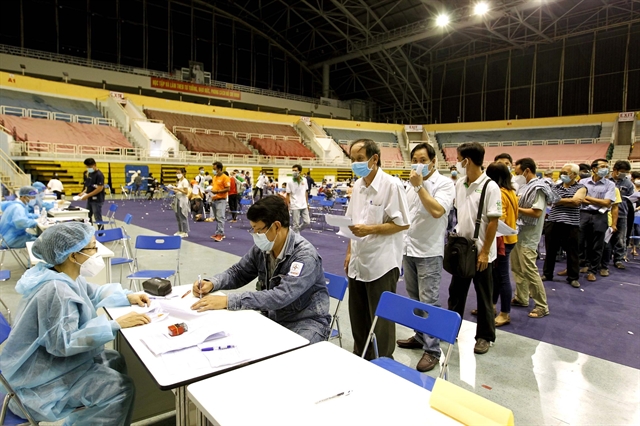 Society
Society

The country had originally targeted herd immunity by the end of this year.

|
| Eligible people for vaccination waiting in line at Phú Thọ Indoor Sport Stadium in HCM City on June 24 as the city conducted what can be considered largest pilot run on mass vaccination efforts in the country, administering 800,000 doses of AstraZeneca received as aid from the Japanese Government in a week's time. — VNA/VNS Photo Thanh Vũ |
HÀ NỘI — Việt Nam's health ministry has announced the country's COVID-19 vaccination plan for 2021-22, which aims to achieve herd immunity by April 2022.
The country had originally targeted herd immunity by the end of this year.
The plan, signed by health minister Nguyễn Thanh Long, said the "biggest inoculation drive in the country's history" with 19,000 vaccination sites being set up will take place between July this year until April 2022, starting with 7.8 million doses of COVID-19 doses are set to arrive in Việt Nam this month, after a long period of inconsistent deliveries of small batches from late February.
The inoculation of at-risk groups and communities is emphasised as an “active prevention and control measure” in the plan and the objectives are to safely vaccinate at least 50 per cent of the adult population (18 years old and above) within 2021 and 70 per cent of the entire population by the end of the first quarter of 2022.
The plan also laid out the principles of the vaccination drive with the implementation scale at all communes, wards and townships across the country and using all approved vaccines from different sources to ensure coverage rate and as fast as possible to avoid waste of expired doses.
The plan also aims to mobilise the entire political system in the drive, with the involvement of not only the health sector but also the police, military and socio-political organisations, along with youth and women’s unions.
Four groups of cities and provinces will be given priority in the drive – outbreak-hit localities; localities in key economic regions or in regions with central Government-level pilot economic development projects; localities with many industrial zones, industrial clusters, high volumes of workers and residents; and border localities that have high traffic volume with other countries, and localities with international border gates.
The health ministry’s allocation of vaccines to cities and provinces, along with other statistics regarding vaccinations, will be made public on the website tiemchungcovid19.gov.vn/portal.
The health minister called for an "intense" application of information technology for vaccination management. People can register for vaccination appointments and submit their health status and update their post-injection reactions through the Sổ Sức Khoẻ Điện Tử (electronic health book app) available on both Android and iOS.
The document puts the number of vaccines that Việt Nam has secured orders for at 105 million – 38.9 million doses from the COVAX Facility, 31 million with Pfizer/BioNtech, and 30 million doses of AstraZeneca via the Việt Nam Vaccine Company (VNVC), along with five million doses as donations from Australia, China and Japan).
Long has said talks are ongoing for supply deals of Moderna and Sputnik V vaccines.
The vaccination efforts in Việt Nam began in March this year, with frontline forces first to be jabbed. Workers in industrial zones have in recent months also been deemed eligible for the jabs after serious outbreaks involving industrial areas in the northern provinces of Bắc Giang and Bắc Ninh.
The plan is subject to revisions depending on the "outbreak situation and vaccine supply capacity," the document noted.
The plan also provides for regulations and instructions on storage and delivery/transport for different types of vaccines and the responsibilities of each party involved in the process.
Starting from August, the military-managed cold chain storage units will be utilised to keep the doses.
Some vaccines that require ultracold storage conditions can be preserved at normal fridge temperatures (2-8oC), but the window between the time they leave the original storage to be moved to military cold chains storage units before distribution to vaccination sites must not exceed three days.
These vaccine batches, even unopened, cannot be moved to ultracold storage again, it noted.
The plan also regulates vaccination organisation, including mobile vaccination venues, scheduling to avoid overcrowding.
Each group of 3-4 vaccination venues must have at least one mobile emergency team ready to provide assistance.
Provincial and city general hospitals also have to reserve a minimum of five beds for intensive care to be ready to handle severe post-injection complications.
As of Thursday, 3,983,800 doses of COVID-19 vaccines had been administered in Việt Nam, with 249,532 people fully vaccinated. — VNS
| Vaccination priority The plan provides the list of 16 eligible groups for vaccination, with frontline forces directly involved in the fight against COVID-19 and essential workers for economic development prioritised. The plan has expanded to freelance workers, students and religious officials this time.
|